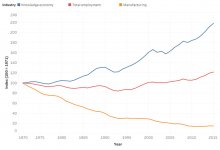No one who actually has engaged with those works of elite thinkers (most of them ex-marxists themselves) fails to understand these truisms. But it dosen't change aything as far as their conclusions regardig managerial elites go.
(I promise I won't quote Sam Francis gain, but this is just too perfect)
Although the bourgeois elite made use of state power on occasion to secure its economic advantage, its principal political interest was in the use of the state to control criminals and to suppress challenges to its dominance from prescriptive reactionaries on the right and from radicals, revolutionaries, and lower-class insurgents on the left. In the 19th century, both of these political challenges from the right and left sought to use the executive sectors of the state to limit or overthrow the bourgeois order, and it was with the dynastic monarchies of the prescriptive order that the established aristocracies, churches, and privileged guilds, which the bourgeoisie regarded as mortal enemies, had been associated. In practical terms, therefore, the bourgeois elites of the 19th century sought to consolidate their own power and circumscribe the power of their challengers through the control and supremacy of legislative assemblies and through the formulation of laws and constitutions that effectively locked these assemblies and the bourgeois elites that controlled them into power. This process constituted what R.R. Palmer called “The Age of the Democratic Revolution,” by which what would become bourgeois forces delivered themselves from the power of established monarchs, churches, aristocracies, guilds, and other privileged institutions. “In Europe,” writes Palmer, the revolutionary movement, though it carried aristocratic liberalism and Babouvist communism at its fringes, was most especially a middleclass or “bourgeois” affair, aimed at the reconstruction of an old order, and at the overthrow of aristocracies, nobilities, patriciates, and other privileged classes



